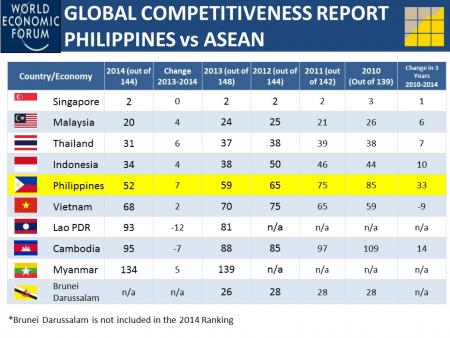Bam Welcomes PH’s Improvement in WEF Rankings
Sen. Bam Aquino welcomed the country’s climb to 52nd place in the latest WEF Global Competitiveness Report 2014-2015, saying it is a fruit of the administration’s “Tuwid na Daan” advocacy.
“This is a clear proof that the government’s fight against graft and corruption and push for good governance are working and moving the country forward in the right direction,” said Sen. Bam.
According to the report, the Philippines is the most improved country as it climbed 33 places since 2010, the largest over that period among all countries studied.
Sen. Bam said the country has made great strides in terms of the institutions pillar, particularly in the fight against graft and corruption.
“From 125th in 2010, we have climbed to 67th, a remarkable improvement that could be credited to the government’s intensified campaign against corruption,” Sen. Bam said.
Sen. Bam also noted the country’s improvement in terms of ethics and corruption, moving from 135th in 2010 to 81st this year.
This year, the country improved in 10 of the 12 categories of the index, with Macroeconomic Environment (up 14 from 40th to 26th); Business Sophistication (up 3 from 49th to 46th) and Innovation (up 17, from 69th to 52nd) as strongest areas.
“We need to allow more Filipinos to be able to do business easily and discover the next big innovative product and service out there,” said Sen. Bam, Chairman of the Senate Committee on Trade, Commerce and Entrepreneurship.
The country also improved in terms of Higher Education and Training (up 3 from 67th to 64th); Institutions (up 12, from 79th to 67th); and Technological Readiness (up 8, from 77th to 69th).
However, the report recommended that the Philippines work on Labor Market Efficiency, Infrastructure and Health and Primary Education, where it ranked in the low 90s.
“Sa gitna ng mga reporma, kailangan pang paigtingin ang ating mga kilos upang bigyan ng sapat na serbisyo ang mamamayang Pilipino sa edukasyon at kalusugan,” said Sen. Bam.
After recording the largest gain this year, the Philippines is now ranked 5th in ASEAN, behind Singapore, Malaysia, Thailand, and Indonesia.
“Investment in infrastructure will move us further and beyond,” added Sen. Bam, who recently spearheaded Senate hearings on the traffic woes in Metro Manila and the slow and expensive Internet connection in the country.
The Global Competitiveness Report is an annual publication that provides a comprehensive picture of the productivity and competitiveness of a country by gathering statistical and survey data on over 100 factors grouped into 12 pillars or categories.

Recent Comments